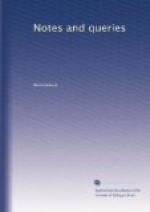“The encrease of this Familie is great, and that dayly, because the withstanders are not many; the defenders are wily as serpentes, and would fayne in lyfe seeme innocent and vnblameable. In profession of the one they boast very much: of the other they walkyng very closely do iustifie themselues, because fewe haue to finde fault with them, yet haue they their lothsome spottes and ougly deformities, as in this booke to the diligent reader playnely may appeare.”
The “lothsome spottes” here intended are the 13th and 14th articles of Wilkinson’s indictment. They run as follows;—
(1.) “H.N. (i.e. Henry Nicholas) saith, It is lawfull for one of his Familie to dissemble,” (i.e., to conceal his religion when questioned by the magistrate); and (2.) “H.N. maketh God the Author of sinne, and the sinner guiltless,” (but no proof is alleged that this speculative impiety was carried out into actual life).
The title of the second treatise to which I alluded is—
“A Confutation of monstrous and horrible Heresies, taught by H.N., and embraced of a number who call themselves the Familie of Love, by I. Knewstub. Imprinted in London, at the Three Cranes in the Vinctree, by Thomas Dawson, for Richard Sergies. 1579.”
He characterises the doctrine of the “Familists” as—
“A masse or packe of Poperie, Arianisme, Anabaptisme, and Libertinisme. Respecting their morals we are told, that although for their loosenesse of life, they are from the toppe to the toe nothing but blottes, yet bragge they of all perfection, euen vnto a verie deifying of themselues.”
Some further light is thrown upon this point by a letter sent to Knewstub from a “godly learned man, W.C.” He says,—
“Howsoeuer, they seduce some goodly and zealous men and women of honest and godly conuersation, placing them at the porch of their synagogue to make a shewe of holinesse, and to stand there as baites and stalles to deceiue others; yet, alas! who can without blushing vtter the shame that is committed in the inwarde roomes, and as it were in the heart of that synagogue of Satan.”
Appended to Knewstub’s book is a further—
“Confutation of the
doctrine of Dauid George, and H.N., the
father of the Familie of Loue,
by M. Martyn Micronius, minister
of the woorde in the Dutche
Churche, at London.”
It was originally written in Latin during the reign of Edward VI. The author charges the “Familists” with maintaining that—
“Idolatry, superstition, and outwarde vices are free and pure vnto them, which, vnder the pretence of a certaine fayth and inwarde puritie, boast that they knowe no sinne in the heart.” (Fo. 87 b.)
Two features particularly distinguish them from other sectaries of the age: they professed obedience to the civil magistrate, whatever might be his religion; and they argued in favour of unlimited toleration both in regard to themselves and others.




